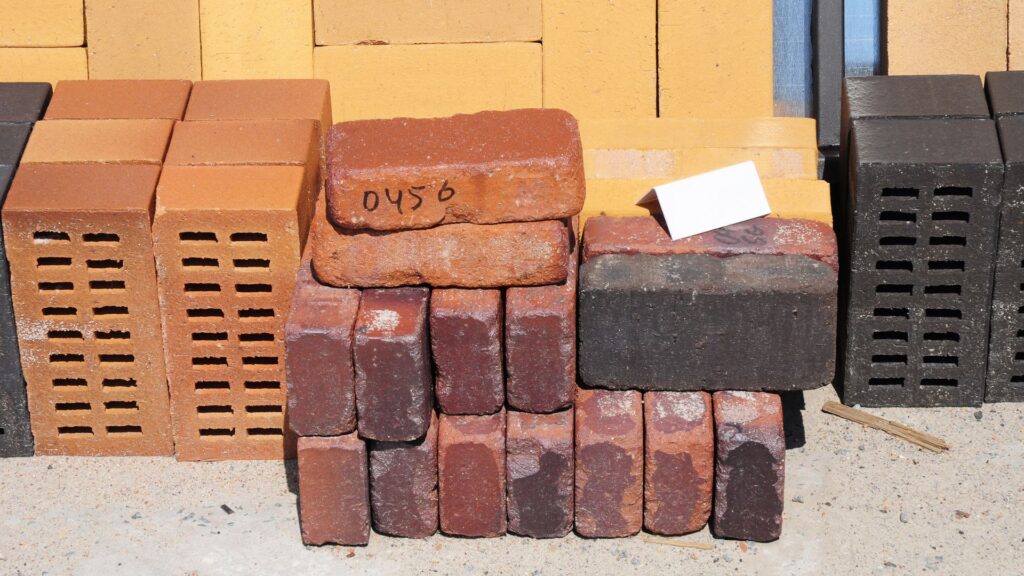Welcome to your go-to guide on concrete for pavers in NZ, where we’ll walk you through everything you need to know before starting your next outdoor project. Whether you’re planning a new driveway, a backyard patio, or a simple garden path, concrete pavers are a popular choice among Kiwi homeowners thanks to their durability, affordability, and wide design options. In this article, we’ll cover what makes concrete pavers so practical for New Zealand’s unique climate, the different types you can choose from, how to install and maintain them, and the costs involved, so you can make confident decisions and create an outdoor space that’s both functional and inviting.
Concrete for pavers in NZ is a durable, cost-effective, and versatile option for driveways, patios, garden paths, and outdoor spaces. Homeowners choose concrete pavers because they handle New Zealand’s weather well, come in a range of colours and finishes, and are easier to install and maintain compared to natural stone. With proper installation and sealing, concrete pavers can last for decades, making them one of the most practical paving choices in NZ.
- What Are Concrete Pavers?
- Why Choose Concrete For Pavers In NZ?
- Types Of Concrete Pavers Available In NZ
- Where To Use Concrete Pavers
- How To Install Concrete Pavers In NZ (Step-By-Step Guide)
- Maintenance Tips For Concrete Pavers
- Cost Of Concrete Pavers In NZ
- Pros And Cons Of Concrete Pavers
- Where To Buy Concrete Pavers In NZ
- FAQs: About Concrete For Pavers In NZ
- Conclusion
What Are Concrete Pavers?
Concrete pavers are individual paving blocks made from a concrete mixture that is shaped and cured before being installed. They are designed for use in outdoor spaces such as driveways, patios, garden paths, and pool areas. Unlike a poured slab, concrete pavers are precast, meaning they are manufactured in molds and then laid piece by piece. This makes them highly versatile and easy to work with, giving homeowners in New Zealand many options for style, layout, and durability.
Difference Between Poured Concrete And Precast Pavers
Poured concrete is when concrete is mixed and poured directly into a designated area, creating one solid surface. While this method can be cost-effective for large spaces, it has a higher chance of cracking over time, especially in New Zealand’s varied climate. Precast pavers, on the other hand, are produced in a controlled environment and then installed individually on-site. If one paver becomes damaged, it can be replaced without disturbing the rest of the surface. This makes precast pavers a practical and low-maintenance choice for many homeowners.
Why Kiwis Choose Them For Outdoor Spaces
New Zealand homeowners often choose concrete pavers because they offer a strong balance of durability, affordability, and design flexibility. They handle the country’s changing weather well, from heavy rainfall to coastal conditions, and are available in many textures and colors that complement different styles of outdoor living. Many Kiwis also appreciate that pavers are easy to install and can be laid in creative patterns, giving outdoor spaces a personal touch without a high cost.
Quick Comparison With Other Materials
When comparing concrete pavers with other paving materials, a few clear differences stand out:
- Stone: Natural stone is premium and visually unique but comes at a much higher price and may require more upkeep.
- Brick: Brick offers a classic look but can fade or chip faster under constant use and weather.
- Asphalt: Asphalt works well for driveways but lacks the decorative appeal and variety that concrete pavers provide.
Concrete pavers combine practicality with style, offering a solution that suits New Zealand’s climate and lifestyle. By understanding what sets them apart from poured concrete and other materials, homeowners can make more confident choices when upgrading their outdoor spaces.
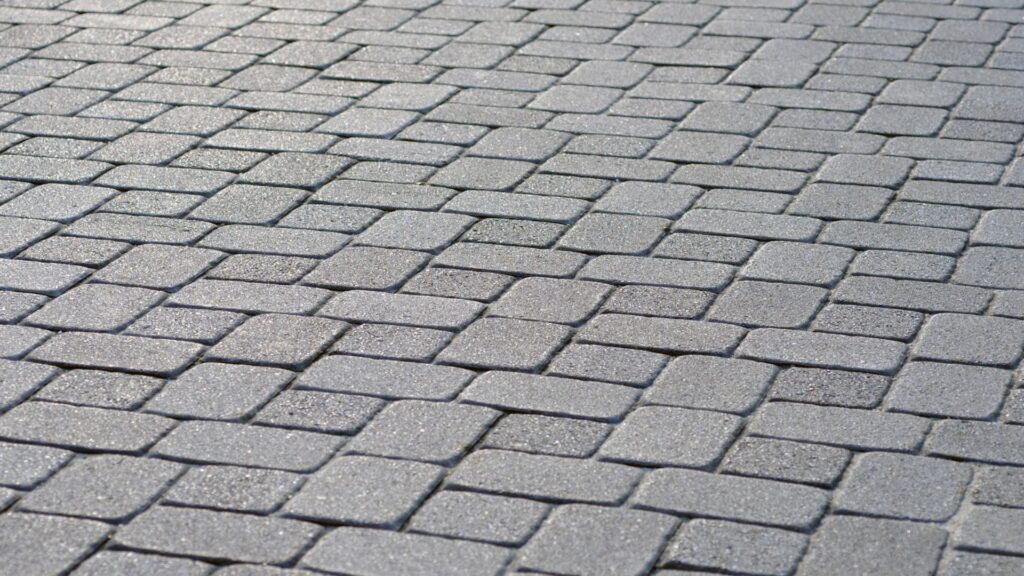
Why Choose Concrete For Pavers In NZ?
Concrete has become one of the most reliable paving options for homeowners and property developers across New Zealand. When compared to other materials, concrete pavers consistently deliver the right balance of strength, cost, and design flexibility, making them an attractive choice for both residential and commercial projects. Below are the main reasons why concrete stands out for paving in NZ.
- Durability in NZ’s climate: New Zealand weather can be unpredictable, ranging from heavy rainfall and frosty mornings to the salty air of coastal regions. Concrete pavers are built to withstand these challenges without losing their structural integrity. They are less likely to shift, warp, or crack under typical weather conditions, making them a long-term investment for outdoor spaces.
- Affordability compared to natural stone: While natural stone offers a premium look, it often comes with a much higher price tag. Concrete pavers, on the other hand, deliver a similar aesthetic at a fraction of the cost. This affordability allows homeowners to complete larger areas, such as driveways or patios, without exceeding their budget while still achieving an attractive and durable finish.
- Design versatility: One of the key advantages of concrete pavers is the wide range of styles available. From smooth, modern finishes to textured, rustic looks, concrete can be customised to suit almost any outdoor design. Colour choices and patterns add even more flexibility, helping homeowners create spaces that complement their homes while reflecting personal style.
- Local availability: Concrete pavers are widely produced by suppliers across New Zealand, making them easy to source without the long waiting times or high shipping costs often associated with imported products. Choosing locally made pavers also supports NZ businesses and ensures that the materials are designed to handle local conditions effectively.
Choosing concrete pavers in NZ means selecting a paving option that balances strength, cost, style, and availability. With so many benefits, it’s easy to see why concrete continues to be a go-to solution for creating functional and attractive outdoor spaces.
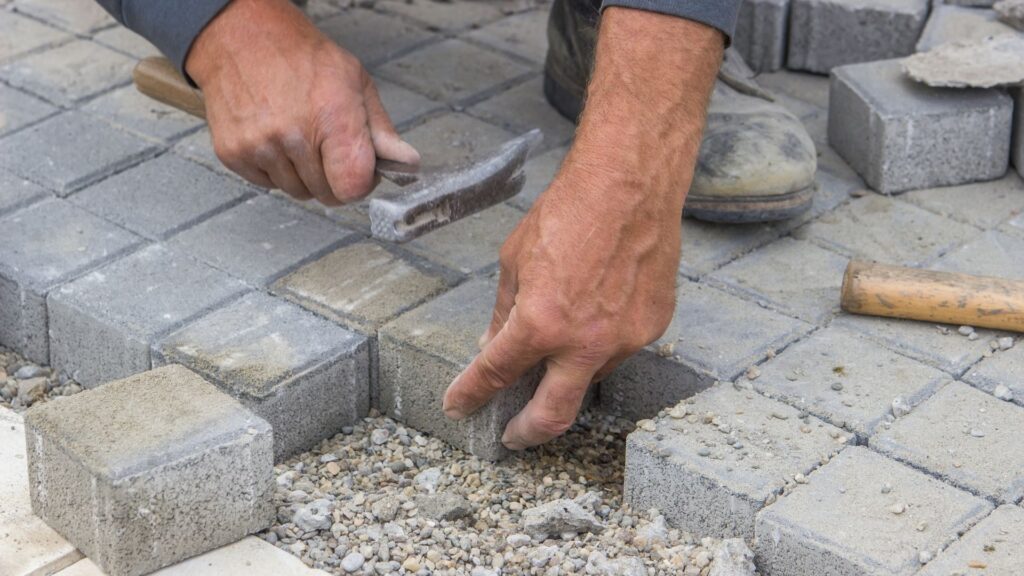
Types Of Concrete Pavers Available In NZ
When it comes to upgrading outdoor spaces, homeowners in New Zealand have a wide variety of concrete paver options. Each type comes with its own strengths, making it easier to find something that suits your style, budget, and the local environment. Below are some of the most common types you will find across NZ, along with a brief look at average price ranges.
Standard Concrete Blocks
These are the most widely used pavers in New Zealand. Standard concrete blocks are strong, cost-effective, and practical for everything from driveways to pathways. They usually come in rectangular or square shapes and are designed for functionality rather than decorative appeal. On average, standard blocks are among the most affordable, typically ranging from $40 to $60 per square metre.
Decorative Stamped Concrete
If you want the durability of concrete but the look of natural stone, decorative stamped concrete is an excellent choice. These pavers are designed with patterns and textures that mimic stone, brick, or even wood. They are ideal for patios and courtyards where appearance matters just as much as performance. In NZ, decorative stamped concrete tends to cost a little more, usually between $70 and $100 per square metre depending on the design.
Coloured Or Dyed Options
For those looking to add personality to their outdoor area, coloured or dyed concrete pavers are a practical option. The colouring process blends pigments directly into the concrete, allowing for a wide range of shades. Whether you want earthy tones that blend with your garden or modern greys for a sleek look, dyed pavers give you that flexibility. The cost generally falls between $60 and $90 per square metre.
Exposed Aggregate Pavers
Exposed aggregate is a stylish option that reveals the natural stones or pebbles within the concrete. These pavers have a textured surface that not only looks attractive but also provides better grip, making them ideal for pool areas or walkways that may get slippery. In terms of price, exposed aggregate pavers in NZ can range from $80 to $120 per square metre depending on the finish and materials used.
Permeable Concrete Pavers (Eco-Friendly For Stormwater)
Permeable pavers are growing in popularity across New Zealand due to their eco-friendly benefits. They allow water to drain through the gaps or porous material, reducing runoff and helping manage stormwater more effectively. These pavers are especially useful in urban areas where flooding can be an issue. Because of the added functionality, permeable concrete pavers often cost a bit more, typically ranging from $90 to $130 per square metre.
Brief Mention Of Average Price Ranges
While prices vary depending on suppliers, styles, and installation, homeowners in NZ can generally expect to pay anywhere between $40 to $130 per square metre for concrete pavers. Standard blocks sit at the lower end of the range, while decorative, exposed aggregate, and permeable options are on the higher end due to their design and performance features.
Concrete pavers in NZ offer something for every type of project, whether you are looking for a basic and affordable solution or a more decorative and sustainable option. By understanding the different types and their costs, you can make a confident choice that balances function, style, and budget.
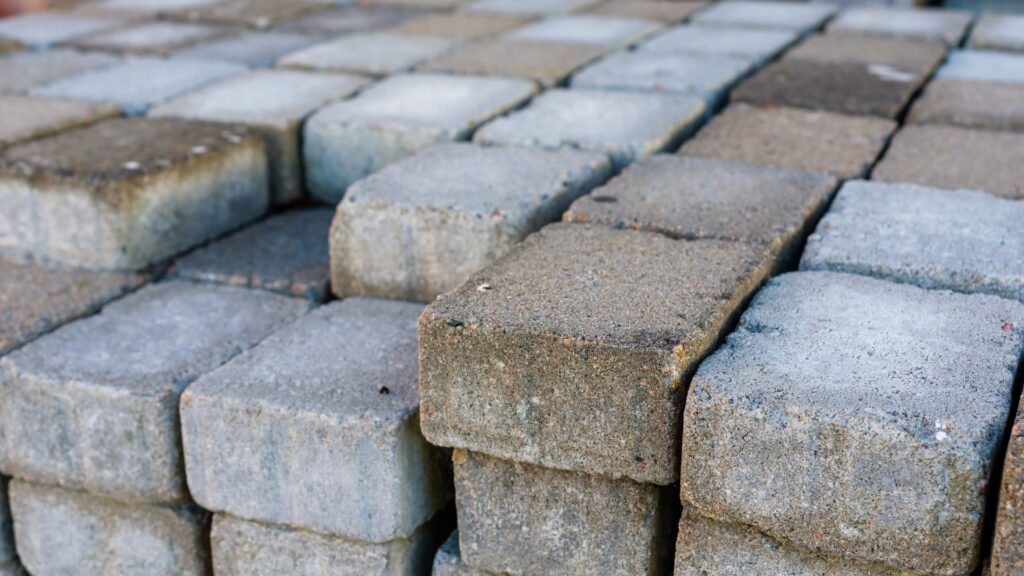
Where To Use Concrete Pavers
Concrete pavers are a versatile option for New Zealand homeowners, offering both durability and design flexibility. They can be used in a wide range of outdoor spaces, each with its own unique benefits depending on the setting and purpose.
- Driveways: strength focus
Driveways require a paving solution that can handle heavy loads and constant traffic. Concrete pavers are a strong and reliable choice because they distribute weight evenly and are less likely to crack compared to poured concrete. They also allow for individual replacements if damage occurs, which makes long-term maintenance easier and more cost-effective. - Patios and courtyards: design focus
For areas where appearance matters most, concrete pavers come in a variety of colours, shapes, and finishes that can match the style of your home. Whether you prefer a modern, clean look or a more natural stone effect, pavers can be arranged in different patterns to create inviting spaces perfect for relaxation or entertaining. - Garden paths and walkways: practical focus
Concrete pavers are ideal for paths because they provide a safe, solid walking surface while blending seamlessly into your landscape design. They can guide visitors through your garden, reduce muddy tracks, and add structure to outdoor areas. Their slip-resistant qualities also make them a practical choice for families and older homeowners. - Pool areas: non-slip textures
Safety is a priority around pools, and concrete pavers with textured or exposed aggregate finishes provide excellent grip underfoot. They are also resistant to water damage, making them suitable for the wet conditions around swimming pools. In addition, lighter coloured pavers stay cooler in the sun, which helps create a comfortable surface to walk on barefoot. - Outdoor entertainment spaces
From BBQ areas to outdoor dining setups, concrete pavers create level, durable flooring that can handle regular use. Their design flexibility means you can create a stylish base for furniture while maintaining an easy-to-clean surface. With the right choice of paver, you can build an outdoor area that feels like an extension of your home.
Concrete pavers fit into almost any outdoor project, balancing practicality with design. By selecting the right type for each space, you can achieve both functionality and a look that complements your lifestyle.
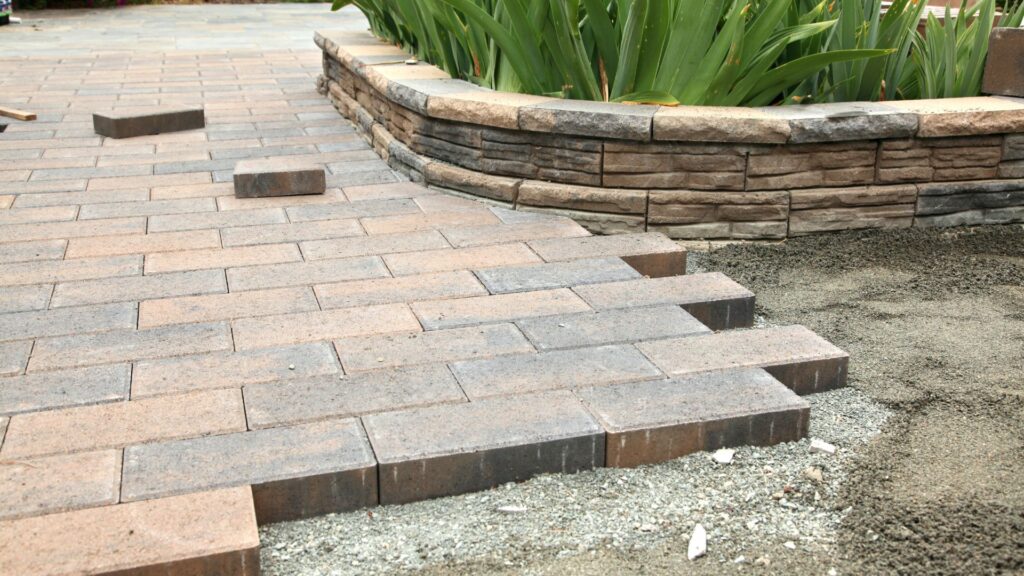
How To Install Concrete Pavers In NZ (Step-By-Step Guide)
Installing concrete pavers can seem like a big project, but with the right preparation and patience, it is very achievable. A well-installed paved area not only looks great but also lasts for years with minimal maintenance. Below is a simple yet detailed guide on how to install concrete pavers in New Zealand conditions.
Site Preparation: Measure, Mark, And Dig
The first step is planning your layout. Measure the area carefully and mark out the boundaries using stakes and string lines. This ensures your paving will be straight and evenly aligned. Once the area is marked, begin excavating the ground to a depth of about 150–200mm. This depth allows room for the base materials and pavers while keeping the surface level with surrounding ground. Remove any grass, roots, or debris to create a clean, stable foundation.
Base Preparation: Compacted Gravel And Sand
A solid base is crucial for preventing sinking or shifting. Start by adding a layer of compacted GAP20 gravel or crushed stone to a depth of about 100–150mm. Compact the gravel thoroughly using a plate compactor. On top of the gravel, spread a 20–30mm layer of washed sand. Screed the sand to create a smooth and level surface that the pavers will sit on. The combination of gravel and sand ensures good drainage and stability, which is essential for New Zealand’s varied weather conditions.
Laying The Pavers: Patterns (Herringbone, Stretcher Bond, Basket Weave)
Once the base is ready, begin laying the pavers in your chosen pattern. Popular options include herringbone for driveways, stretcher bond for patios, and basket weave for garden paths. Start from a corner or straight edge and work your way outwards, placing each paver snugly against the next. Using spacers or eye-measuring small gaps ensures even joints throughout the layout. As you lay, check levels regularly with a spirit level to maintain a flat and uniform surface.
Edge Restraints
Edge restraints keep your pavers from spreading over time. These can be concrete edging, timber, or plastic paver restraints. Secure them firmly along the boundaries to hold the pavers in place. This step is especially important for high-traffic areas like driveways, as it prevents the edges from crumbling or moving under pressure.
Joint Filling And Sealing
After laying all pavers, spread fine dry sand or polymeric sand over the surface and sweep it into the joints. This locks the pavers together and prevents weeds from growing. Compact the area again to settle the sand, and add more if necessary until joints are full. Sealing the pavers with a quality sealer helps protect against stains, fading, and weather damage. While sealing is optional, it extends the lifespan and enhances the colour of the concrete.
DIY Vs Hiring A Professional
Installing concrete pavers can be a satisfying DIY project for small patios, paths, or garden features. It saves money and gives you full control over the design. However, for large driveways or areas that must withstand heavy loads, hiring a professional installer is recommended. Professionals have the right tools, knowledge of local conditions, and experience to deliver a long-lasting result.
Laying concrete pavers in New Zealand is a straightforward process if you follow the right steps. From proper site preparation to final sealing, each stage plays an important role in ensuring a durable and attractive finish. Whether you tackle it yourself or hire an expert, the end result will add value and style to your outdoor space.
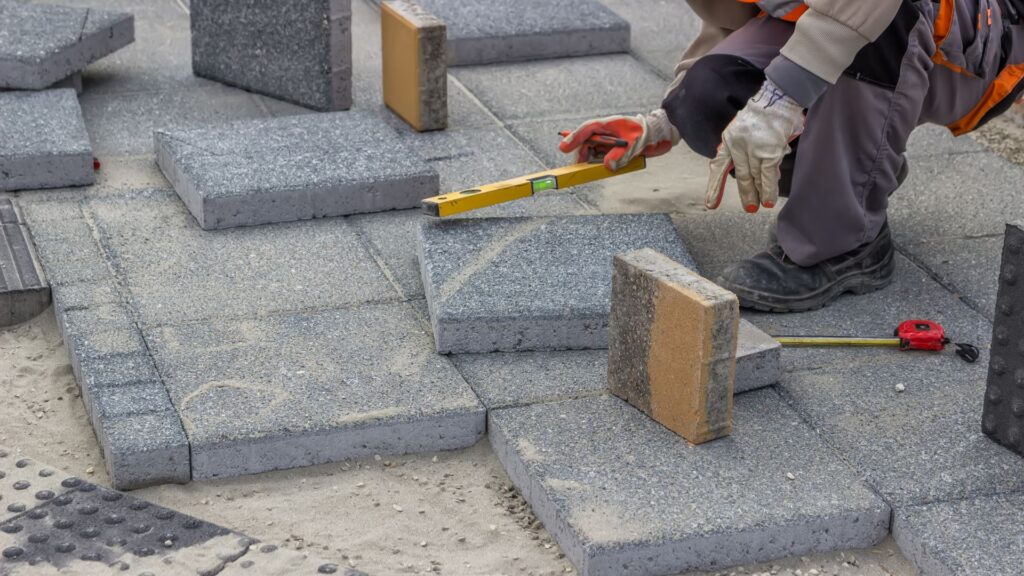
Maintenance Tips For Concrete Pavers
Keeping your concrete pavers in good condition is not difficult, but it does require consistent care. A well-maintained paved area will not only look better but will also last longer and provide better value over time. Here are the key steps to follow if you want your pavers to stay strong and attractive for years to come:
- Regular cleaning: Start by sweeping your pavers often to remove dirt, leaves, and debris. This simple step prevents stains and keeps moss or algae from forming. For a deeper clean, you can use a water blaster, but it’s important to use it carefully. Holding the nozzle too close or at the wrong angle may damage the surface or loosen the sand between the joints.
- Weed control in joints: Weeds often find their way into the small gaps between pavers. If left unchecked, they can cause shifting and make the area uneven. Pull weeds out by hand or use an appropriate weed killer to stop them from growing back. Another option is to reapply jointing sand after cleaning, which helps lock the pavers in place and makes it harder for weeds to grow.
- Resealing for colour retention and durability: Over time, exposure to the sun and weather can cause pavers to fade or lose their fresh appearance. Applying a sealer helps protect the surface, keeps colours vibrant, and adds a protective layer against stains. Depending on the amount of use and the climate in your area, resealing every two to three years is recommended.
- Repairing cracked or chipped pavers: Even with the best care, pavers can crack or chip due to heavy loads, frost, or accidents. The good news is that individual pavers are easy to replace without disturbing the entire surface. By keeping a few spare pavers on hand, you can quickly swap out damaged ones and maintain a smooth, polished look.
Taking the time to maintain your concrete pavers not only keeps them looking fresh but also extends their lifespan, making your outdoor space a lasting investment. With a little effort, your driveway, patio, or garden path will continue to enhance your home for many years.
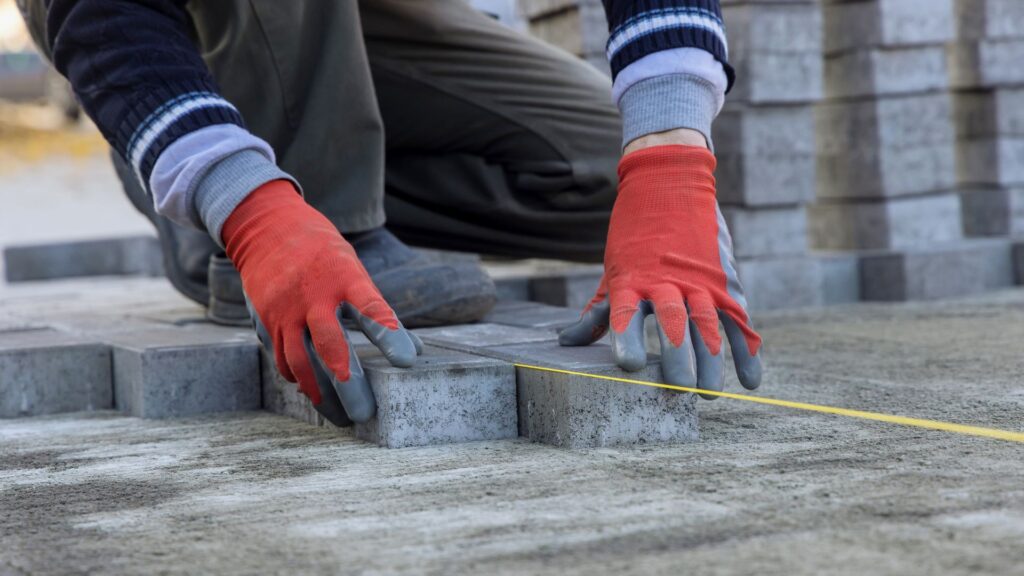
Cost Of Concrete Pavers In NZ
When planning an outdoor project, cost is one of the first factors most homeowners in New Zealand consider. Concrete pavers are known for being a practical and budget-friendly choice compared to other paving materials, but the final price can vary depending on several elements.
- Average price per square metre: In New Zealand, concrete pavers usually range from $40 to $100 per square metre. Standard grey pavers often sit at the lower end of the range, while decorative finishes such as coloured, textured, or exposed aggregate options are priced higher. Premium styles can exceed $100 per square metre, especially if they feature unique designs or specialist finishes.
- Factors that affect cost: Several aspects influence the overall cost of concrete pavers. The size of the paver plays a role, as larger pavers often require fewer pieces but may cost more individually. The style and finish also add to the price, with decorative or permeable pavers costing more than plain ones. Installation is another key factor. A DIY approach may reduce labour costs, but professional installation ensures a level and long-lasting result. For driveways or large entertainment areas, hiring an expert is often the best long-term investment.
- Cost comparison with alternatives: When compared to other paving materials available in NZ, concrete pavers remain one of the most affordable. Brick pavers are slightly more expensive due to their durability and colour consistency. Natural stone options such as granite or slate sit at the premium end, offering a unique look but at two to three times the cost of standard concrete. Asphalt is generally cheaper upfront for large areas like driveways, but it lacks the design flexibility, lifespan, and low maintenance benefits that concrete pavers provide.
Choosing concrete pavers gives homeowners in New Zealand a strong balance of affordability, design variety, and long-term value. While other materials may suit specific projects, concrete remains one of the most cost-effective ways to create durable and attractive outdoor spaces.
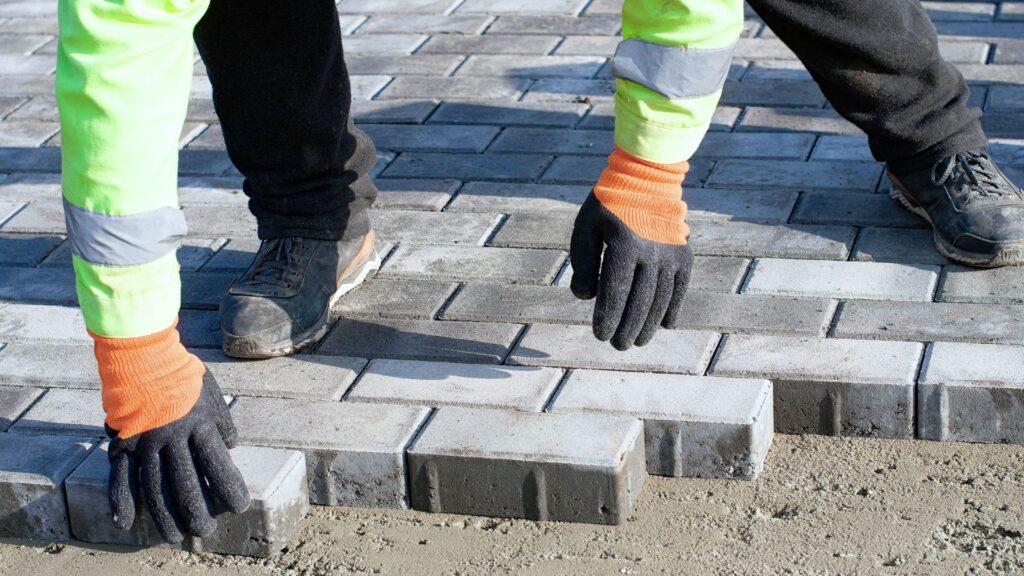
Pros And Cons Of Concrete Pavers
When deciding on materials for driveways, patios, or garden paths, it’s important to weigh the advantages and disadvantages before making a commitment. Concrete pavers are widely used across New Zealand because they strike a balance between practicality and cost, but like any material, they have both strengths and limitations.
Pros Of Concrete Pavers
- Affordable option: Compared to natural stone or brick, concrete pavers are much more budget-friendly. This makes them a popular choice for large projects such as driveways and courtyards where cost can quickly add up.
- Durability in New Zealand’s climate: Concrete pavers can withstand the country’s wet conditions, frosts, and temperature changes, giving homeowners a reliable surface that lasts for decades with proper care.
- Easy to source locally: Because they are produced by many suppliers across NZ, concrete pavers are readily available. This reduces both waiting times and shipping costs.
- Design versatility: From smooth finishes to exposed aggregate, coloured options, and decorative patterns, concrete pavers can be tailored to suit modern, traditional, or rustic outdoor spaces.
Cons Of Concrete Pavers
- Potential fading and cracking: Exposure to direct sunlight and heavy use may cause fading over time. Cracking is also possible if the pavers are not installed correctly or if the base is poorly prepared.
- Maintenance requirements: While concrete pavers are relatively low-maintenance, they often benefit from sealing to maintain colour and prevent stains or moss growth. This adds an extra step for homeowners who want a long-lasting finish.
- Not as premium as natural stone: For those who value luxury aesthetics, concrete pavers may not achieve the same high-end look as granite, sandstone, or marble. Although design options are improving, they are still seen as a more practical rather than a premium choice.
Concrete pavers offer a dependable, cost-effective solution for many outdoor projects in New Zealand, but understanding both their strengths and weaknesses will help you make the right decision for your space.
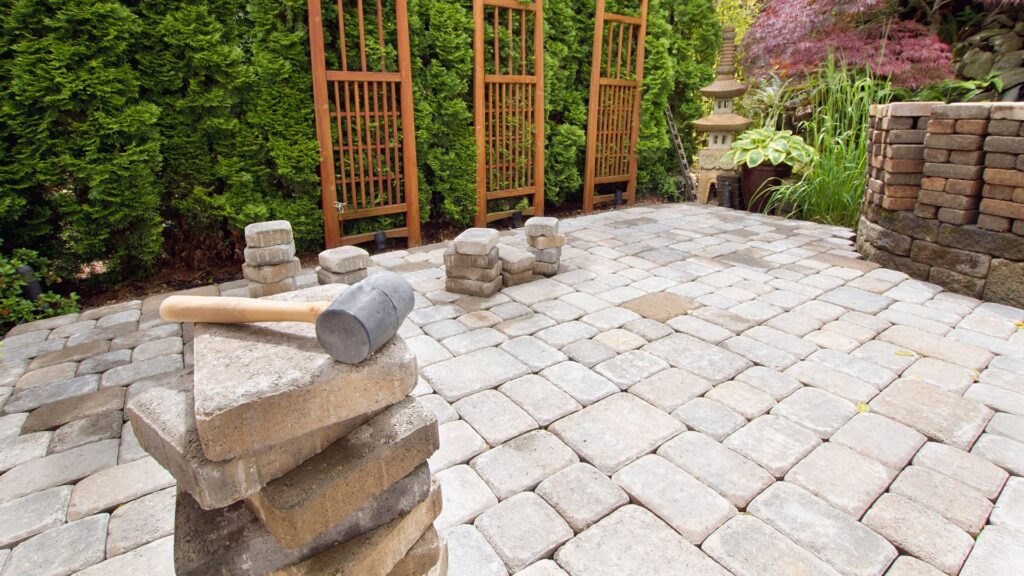
Where To Buy Concrete Pavers In NZ
Finding the right supplier for concrete pavers in New Zealand can make a big difference in both price and quality. Thankfully, there are plenty of options across the country that cater to homeowners, landscapers, and builders.
- Local suppliers and hardware stores: Large home improvement chains such as Mitre 10 and Bunnings are popular choices because they carry a wide selection of concrete pavers in different sizes, finishes, and colours. They also tend to offer competitive pricing and nationwide availability, which makes it easier to find what you need no matter where you live. In addition, many smaller landscape yards and local hardware stores stock pavers and can provide advice that is tailored to the conditions in your region.
- Specialty paver suppliers: If you are after unique designs, premium finishes, or eco-friendly options such as permeable pavers, specialty paver suppliers are worth exploring. These companies focus solely on paving and landscaping products, often providing more variety than big-box retailers. Some suppliers may also offer custom solutions for driveways, patios, or commercial projects, giving you more flexibility in design.
- Advice: Before making a purchase, compare your options carefully. Check whether delivery is included or if there are additional costs, especially if you are buying in bulk. It is also helpful to visit showrooms where you can see and feel the pavers in person. This allows you to choose a product that not only fits your budget but also matches the look and durability you want for your outdoor space.
A little research into local and specialist suppliers can save you money and ensure you get the right pavers for your project. Taking the time to compare products, prices, and delivery options will help you create a long-lasting and attractive paved area that suits your home perfectly.
Looking to transform your outdoor space with concrete pavers in NZ? Visit Nelson Concrete to explore quality paving solutions and expert advice.
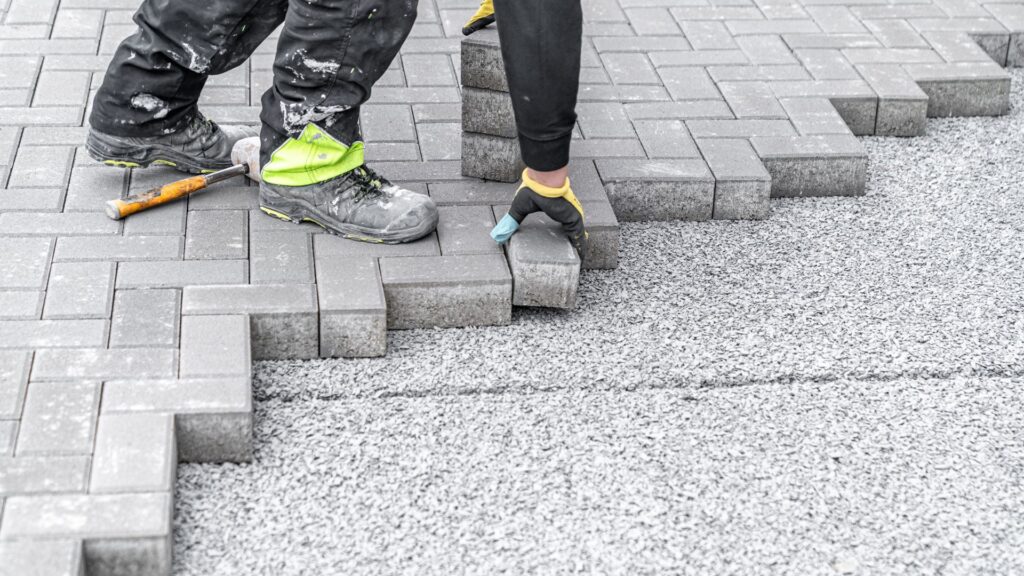
FAQs: About Concrete For Pavers In NZ
Concrete pavers are precast blocks made from concrete, designed for outdoor surfaces like driveways, patios, and paths. They are popular in NZ because they are affordable, durable, and available in a variety of styles that suit different landscapes.
When properly installed and maintained, concrete pavers can last 20–30 years or more. They are resistant to NZ’s wet weather and temperature changes, making them a reliable long-term choice.
Yes, in many cases. Concrete pavers are easier to install, repair, and replace compared to poured concrete. They also allow for creative patterns and reduce the risk of large cracks.
Sealing is recommended to protect pavers from staining, fading, and moss growth. While not mandatory, sealing helps extend the life and maintain the appearance of concrete pavers.
Concrete pavers typically cost between $40–$100 per square metre, depending on size, style, and finish. Installation costs vary based on whether you do it yourself or hire a contractor.
DIY installation is possible with the right tools and preparation, especially for small areas like garden paths. For large driveways or patios, hiring a professional ensures a durable and level finish.
Standard smooth pavers can be slippery, especially around pools. Choosing textured, non-slip, or exposed aggregate pavers is a safer option for wet areas.
Regular sweeping, occasional water blasting, weed control in the joints, and resealing every few years are the best ways to keep pavers looking good and lasting longer.
Options include standard concrete blocks, coloured or stamped pavers, exposed aggregate, and eco-friendly permeable pavers. Each type suits different styles and purposes.
Concrete pavers are widely available from hardware stores like Mitre 10 and Bunnings, as well as local landscaping suppliers and specialist paver companies across New Zealand.
Conclusion
Concrete pavers remain one of the most practical choices for NZ homeowners, offering a balance of durability, affordability, and design flexibility that suits a wide range of outdoor projects. Whether you’re planning a driveway that can handle heavy use, a stylish patio for entertaining, or a simple garden path, concrete pavers provide a long-lasting and low-maintenance solution that performs well in New Zealand’s varied climate. By weighing factors such as your budget, the style you want to achieve, and the level of durability needed for your space, you can make a confident decision that enhances both the look and function of your property. Ready to upgrade your outdoor area? Explore local NZ suppliers or consult a paving expert today to find the right option for your project and bring your vision to life.
About the Author:
Mike Veail is a recognized digital marketing expert with over 6 years of experience in helping tradespeople and small businesses thrive online. A former quantity surveyor, Mike combines deep industry knowledge with hands-on expertise in SEO and Google Ads. His marketing strategies are tailored to the specific needs of the trades sector, helping businesses increase visibility and generate more leads through proven, ethical methods.
Mike has successfully partnered with numerous companies, establishing a track record of delivering measurable results. His work has been featured across various platforms that showcase his expertise in lead generation and online marketing for the trades sector.
Learn more about Mike's experience and services at https://theleadguy.online or follow him on social media:
